- Home
- Rudy Rucker
Spacetime Donuts Page 5
Spacetime Donuts Read online
Page 5
The security prison was totally automated. The robot-operated paddy wagon drove in, and a door closed and locked behind it. The van opened and Vernor exited to follow a Hollow of a guard through a series of automatically operated doors. Soon he was in a small cell thirty floors above street level. It was with a feeling of great relief that Vernor discovered that he had a cell-mate, a middle-aged conman.
"They're putting a goddamn Dreamer up here with me now," the man observed, noticing Vernor's socket. "Whadja do, kiddo, this floor's reserved for the hardened criminal types like yers truly." The man smiled and rummaged under his bed. "Got my picture in the paper, I did. Here." He handed a yellowing scrap of plastic to Vernor.
It was a clipping from USISU, the national daily newspaper. Vernor had hardly ever seen the paper. When he read, it was science or philosophy, and when he wasn't reading he was usually around people who got all their information from the Hollows. A small picture of his cell-mate was captioned, "Bernard 'Boingy' Baxter," and the accompanying article was headlined "Hollow Con No Wallet."
"I had the sweetest number," Boingy reminisced, "I'd put on this special suit that made me look like a Hollow. You know, it was kind of fuzzy and shiny and had little sparkles all over it. I'd get all cleaned up and then start beating on some Drone's door. Guy'd come out, usually drunk or strung out: 'Huh?' 'Greetings, Citizen!' I'd say. 'I'm a secret Hollow sent here with an important message for you from the President himself.' And the guy is, you know, looking around, and I'd say, 'Long distance Hollowcast from the Pentagon, friend, touch me if you don't believe it.' And I'd hold out my left hand, only, and this was the pisser, it wasn't my real left hand, it was a Hollow of my left hand. My real left hand'd be up my sleeve holding a little Hollowcaster." Boingy paused, and Vernor nodded.
"So the Drone feels the Hollow hand and it seems all right and then I ask him to show me some I.D. so I know it's really him. And he gets out his wallet . . . and then I'd make my move."
"You mean you'd grab the wallet and run?" Vernor asked.
Boingy looked shocked, "I'm a conman, not a mugger. No, I'd just look real officious and say, 'Let me examine your money, Citizen. We're searching for counterfeit.'"
"And they'd give it to you?"
"Man, I was from the government. By the time they stopped to wonder how a hollow was able to actually touch their money and put it in his pocket I'd be gone. Boing." He burst into laughter, almost certainly genuine, though he kept a sharp eye on Vernor's reaction. Vernor laughed.
"I'll probably win my fucking trial," Boingy continued, wiping his eyes, "I mean I didn't threaten them or promise them anything. Just 'Let's have the money.'" He sighed and shook his head, "People are funny." He stopped and looked out the window, sinking back into the unfunniness of his present situation.
"Well," Vernor said finally, "I was an Angel, but now I'm busted. I guess this is part of the trip."
The jail was automated in order to avoid any problems with bribed or kidnapped guards. The blank cell door never opened. Food came out of a spigot over the toilet, just like back in Dreamtown. In Dreamtown the stuff that came out three times a day had been different colors, but in the prison it was always gray. A gray paste—slightly salty, slightly sweet, a little starch, a little meat. "Sort of looks like shit, oozin' out by the toilet like that," Boingy observed at each mealtime, until Vernor attacked him with his fists.
But things reached a balance between them, and Vernor settled in after a few weeks. He thought about Alice all the time. He began to wonder if he wasn't better off without all the dope . . . when he wasn't wondering how to get some. One seeweed seed was all it would take. God knows he had enough piss to grow it in. But he didn't have that one seed...so he returned to his science work.
Vernor had told the Governor that he could get them to the stars. How? It was, to say the least, a little hazy. He began keeping a journal of his fragmented ideas and his daily attempts to piece them together into an answer.
Weeks turned into months. Vernor and Boingy had no contact with the outside world. Occasionally a Hollow of a guard would appear in their cell and give them instructions. Once a Hollow lawyer came to see Vernor, but he was not a great deal of help, as all he did was to deliver a canned speech about how important Vernor's case was to him. Generally, Boingy explained, once you went into the security prison you could expect to go to court after several years, with a good chance of dismissal or suspended sentence at that time.
"I been in here three years," Boingy said, "and the only other person I've seen was the guy before you. They took him out one day and he never came back."
"How did they take him out, when there's nobody here but prisoners?" Vernor asked.
"The door just swung open and a Hollow asked him to come on."
"Why didn't you go with him?"
"The Hollow told me not to," Boingy answered, looking embarrassed. "I shoulda, you're right, but it was the Governor himself. I was scared. They would've seen me."
Vernor determined that when Boingy's trial came he, Vernor, was leaving with him. Alice and the wonderful outside world were waiting for him. Hollows couldn't see, they were just moving pictures. Still, there was bound to be a checkpoint somewhere . . .
The next week a Hollow of the Governor appeared and the door swung open. The Governor's Hollow gave instructions.
"Please come with me, Citizen (zzzt)," there was a pause while a special sound file played, "Bernard Baxter (zzzt)," The standard spiel came back on, "All other prisoners remain in the cell."
Quickly Vernor slipped across the cell and fitted himself inside the Governor's Hollow. A holographic image is an interference pattern formed by two low-intensity electromagnetic fields. The effect is similar to the standing waves that appear in a river's mouth when the tide is running hard. There was no real danger in standing inside a Hollow, the two fields filled the surrounding area anyway, it was just that in the region of the image they were almost in phase with each other.
Standing inside the Governor's Hollow was like being inside a glowing cloud. Now, if Vernor could just match his movements to those of the Governor's Hollow, he could walk out undetected . . . at least until they switched the Hollow off, but it stood to reason they'd leave it on until it had escorted Boingy to the courtroom.
The months of clean living paid off. Vernor's synchronization was such that it felt more as if the Hollow were moving with him than vice-versa.
Without incident, they proceeded out of the cell and down the hall to an elevator. The whole time the Governor was talking—about democracy, fair trials, repentance and the new life, and public safety. "You will notice," the Hollow boomed as the elevator door closed behind them, "that there is a grate in the wall here. This elevator is also our gas chamber, for those clients whose lawyers waive trial. It is fortunate Citizen (zzzt) Bernard Baxter (zzzt) that your cell-mate did not accompany you. Trial is waived in such cases." The Governor and Vernor nodded to a wide-angle camera lens mounted in the wall.
"Oh, no sir," Boingy said, mopping his brow. "He wouldn't do a crazy thing like that."
The elevator door opened to reveal a courtroom. The Hollow lawyer was there, and sitting on the bench was a Hollow of the Governor. Funny they'd have two Hollows of him at the same time, Vernor thought . . . but they didn't. He was no longer concealed.
"It was his idea, your honor," Boingy shouted. "I didn't know he was inside you." But the Hollow on the bench was already spieling out its recorded speech. There was no camera in the courtroom.
"Citizen (zzzt) Bernard Baxter (zzzt) you have been sentenced to three years' confinement. It is only fitting that you should gladly make this reparation to Us, whose social fabric you have so grievously soiled. But Us is merciful as well as just. The sentence is suspended provided you sign this release form."
A piece of paper appeared on the Governor's bench. Boingy signed with a shaking hand. The Hollows disappeared, and a door to the street slid open. Trying not to run, Boingy and Vernor exited a
nd started down the sidewalk.
"I don't get it," Vernor said. "Why did they let you off?"
"I already been here three years, Vernor. When you go in they decide how long to keep you, and when the time's over they give you the trial with a suspended sentence. This way there's no hassles with appeals and real lawyers. I don't think there are any real lawyers anymore, even."
"How long would they have kept me, do you think?"
"You would have found out at your trial." Boingy walked a few more steps in silence. "You better hope it was for a long time, because when it's time for your trial they're going to notice that you left early."
"Unless they notice sooner," Vernor added, glancing back towards the prison.
"Right," Boingy said shortly. "Right. And so, old pal, I bid you farewell. Good luck, and forget my name until you strike it rich." They shook hands and Boingy Baxter went off down a side street, bouncing on the balls of his feet.
"See you in paradise," Vernor shouted, and headed for the walktube entrance.
Chapter 7: In Mick's Hands
Forty minutes later Vernor was in front of Waxy's. It was the first place the loach would look for him, but for some fucked-up reason it seemed more important to come here than to go straight to Alice. In any case, it would probably be at least a day before they noticed that he'd escaped.
He opened the door cautiously, but the place was just about empty. There was some odd music playing on the Hollowjuke, a recording so old that there was no visual track at all. " . . . just to raise me up a crop of dental floss . . . ," a voice sang. Vernor looked around. There was only one person who listened to music like that.
Mick Turner was sitting at the bar, his hands cupped around a shot glass of synthesmack. Vernor walked up and greeted him effusively, but Turner seemed to be on the nod. His eyes were closed and he was rocking back and forth to the music. Vernor ordered a beer and a reefer. The place was so empty that Waxy himself was tending bar.
"Big bust?" Vernor inquired.
Waxy shook his head sadly. "They came in and got 'em all. Except for him." He rolled his eyes in Turner's direction. "And he might as well be gone. Spends every day junked out of his mind and listening to the Zap." Last winter Mick had somehow talked Waxy into the routine of playing records from his fifty-three-album Frank Zappa collection afternoons. This seemed to be the only remaining tradition from the glory days of the Angels.
Waxy set the beer down in front of Vernor and handed him his reefer. His face brightened with a sudden hope, "Are all the boys getting out today?"
"No, no. I snuck out." Vernor lit his stick of weed and inhaled deeply. This was going to feel good. "How about Turner. How did he keep from getting busted? Haven't they come in here looking for him?"
"They did for awhile. They really wanted him, came in every day. But he has this trick. Look." Waxy pointed to Mick's shot glass.
The glass appeared strangely distorted, now shrunken, now swollen, warped in impossible curves which shifted with the slow twitching of Turner's skinny hands. Vernor looked at his joint, then at Waxy. Waxy shrugged. "He can do it to himself."
Do what? This was getting too mysterious. Vernor shook Mick's shoulder. "Hey, Mick! Come on, man. It's Vernor. I'm out of jail and we've fucking got to do something!" Still no response. Turner's lips were moving slowly, but only to the sounds of the record.
Vernor looked helplessly at Waxy, but the proprietor's sallow face was bent into a rare smile. "Spike him," he said, handing Vernor a loaded syringe. "On the house."
Vernor recalled the evening after he broke up with Alice. Turner had it coming to him. He plunged the needle into Mick's leg. As Vernor watched, his friend's nodding became less fluid, more stroboscopic. His eyelids snapped up like window shades, and his eyes began to focus—
"Loaches coming! Get down!" It was Waxy, who had stationed himself near the window. A blast of adrenalin pulsed in Vernor's skull, but before he could run he realized that this was part of Waxy's practical joke. He turned to tell Mick not to worry, but his friend had disappeared.
"Where'd he go?" Vernor asked, feeling unpleasantly confused.
Waxy was actually grinning. "He's right there. In his chair."
Vernor leaned over and looked. There were Turner's ectomorphic hands, all right. The hands were cupped together as if in prayer. Fine. But the rest of Mick Turner was nowhere to be seen.
"That's how he hides," Waxy explained happily. "He gets inside his hands."
Vernor felt like crying. It was weird enough just being out of prison after seven months, but . . . "Come on you guys," he pleaded. "Give me a break."
Waxy gave a sharp whistle, and the hands on Mick's chair parted, clam-like, to reveal a homunculus, a tiny, distorted Mick Turner. He seemed to be talking, but the voice was so high and quick—and the whole scene so unpleasant—that Vernor's brain couldn't pick out the words. As he watched, the hands seemed to massage the space between them and the tiny figure began to grow.
In a few seconds a very wired Mick Turner was squatting on the bar stool next to Vernor, with one hand beneath his feet and the other on the top of his head. Vernor dragged on his reefer, but it had gone out. On second thought, that seemed like a fortunate thing.
"Vernor Max. I was waiting for someone to break out." As he spoke, Mick was glancing around. In seconds he had made himself comfortable in the new situation. He removed the syringe from his leg—where Vernor, in his excitement, had left it—and he threw it at Waxy.
"Professor K. laid this on me," Mick said to Vernor, holding up his hands. There was a small disc of foil glued to the center of each palm. Wires ran up his arm and under his shirt from the discs. Apparently they were connected to some type of power unit which he wore under his coat. "Probably coulda used this to get some of you guys out, but then I figured anyone who deserved to be out'd make it on their own."
"What is it?" Vernor asked.
"VFG," Mick said, suddenly cupping his hands around Vernor's head. The room around Vernor seemed to be growing, everything seemed to be growing, and his shoulders appeared to stretch out for a yard on each side. "Now your head's shrunk," Mick explained.
"Stop." Vernor gasped, though he felt no actual physical discomfort. "Turn it off."
Mick took his hands away and things snapped back to normal. "This is a portable model of Professor Kurtowski's Virtual Field Generator. VFG. You're the one who spent five years in the library. You must know what it is."
Vernor was incredulous. "The Virtual Field? Sure, his last paper was all about it. But I never thought he could build something that would actually generate it!"
"Yeah," Mick answered. "That's what he's been doing most of these last twenty years. Only now that he's got it, he doesn't know what to do with it. He wanted me to talk to Oily Allie about it, so he gave me this portable model. Only Allie got busted with the rest of them same day I got this thing."
Vernor didn't answer immediately. Something was nibbling at this mind. Circular Scale . . . could he test it with the VFG? Mick was stall talking. The injection had certainly done its work. "So when the loach came busting in I decided to use this on myself. Actually I was going to blow myself up big and scare them, but I turned the dial wrong. Worked good, though, I must of hid from them twenty times the way you just saw."
"Isn't it bad for you?" Vernor interrupted. "I mean getting squashed up like that?"
"You saw how it felt when I shrank your head," Turner replied.
"It didn't feel like anything," Vernor admitted. "Really it felt more like everything else was growing than that my head was shrinking. Relativity."
Turner nodded. "Right. Just now the space inside my hands looked like a little bed to me. Outside you think there's not much space inside my hands, but the VFG stretches the space so there's all the room I need."
"Negatively curved space." Vernor mused.
"Right on," Mick answered. "Geometry and Reality by Dr. Alwin Bitter."
"That's the book I got you to read."
"Sure. That's how I knew this field wouldn't hurt me. It's just like I was a man painted on a sheet of rubber. You can fit the man into a tiny circle painted on the sheet if you just stretch the rubber inside the circle. Or shrink the rubber inside the man."
Vernor was beginning to remember more of Kurtowski's paper on the Virtual Field, "The Geometrodynamics of the Degenerate Tensor." The idea behind the Virtual Field was that it introduced a localized rescaling of the space and time coordinates, but the apparent forces could be renormalized away at any point—which was to say that the field could shrink, expand or bend you without hurting. You shrank, but not by being crushed—all your atoms shrank at the same time, and none of your internal structure was strained or disturbed.
"The Geometrodynamics of the Degenerate Tensor" had ended with some fairly specific suggestions for the experimental investigation of the principles expounded, but by the time the paper came out, laboratory science had been banned in the Us. The dangers of uncontrolled scientific investigation had been deemed too great, and those who insisted on obtaining physical data were requested to send their experiment specifications to Phizwhiz, who would simulate the experiment and produce a set of data. The data Phizwhiz produced were obtained by straight calculation with a touch of randomization . . . no actual physical measurements were made at all. The experimental data obtained in this way tended to conform rather nicely to one's expectations—unfortunately these were of no scientific value.
Determined to get a real test of his theory, Kurtowski had dropped underground, and was said to have constructed a large laboratory for himself somewhere in the Eastside. Andy Silver and Mick Turner were the only Angels who had met him, and Vernor gathered from their elliptical comments that the years of dedicated work had turned Kurtowski into something more than a guru.
"Mick," Vernor said, "you've got to take me to the lab." The VFG was what he needed to test his theory. "I had this idea in jail. Just before jail, actually. I call it Circular Scale. If we could get a big Virtual Field Generator I think we might be able to do something really amazing." His head swarmed with ideas.

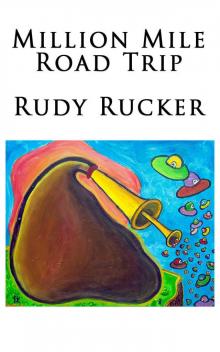 Million Mile Road Trip
Million Mile Road Trip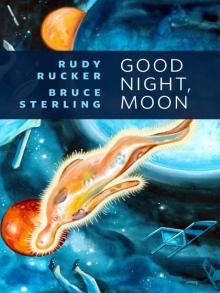 Good Night, Moon
Good Night, Moon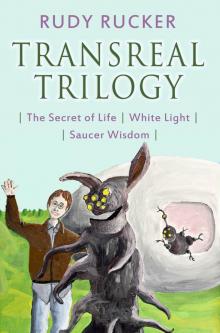 Transreal Trilogy: Secret of Life, White Light, Saucer Wisdom
Transreal Trilogy: Secret of Life, White Light, Saucer Wisdom Complete Stories
Complete Stories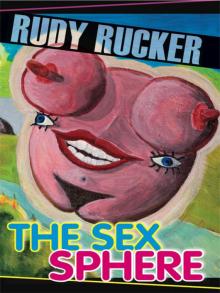 The Sex Sphere
The Sex Sphere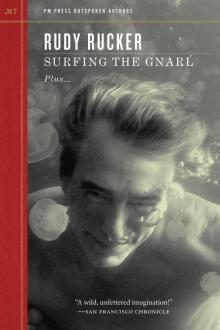 Surfing the Gnarl
Surfing the Gnarl Software
Software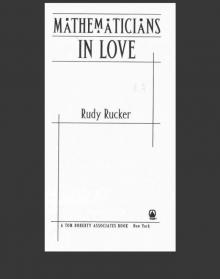 Mathematicians in Love
Mathematicians in Love Seek!: Selected Nonfiction
Seek!: Selected Nonfiction The Secret of Life
The Secret of Life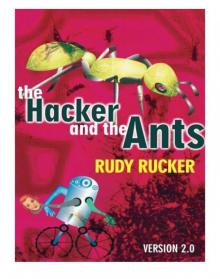 The Hacker and the Ants
The Hacker and the Ants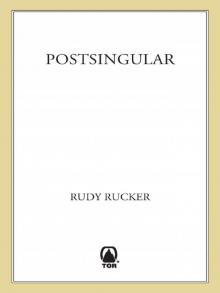 Postsingular
Postsingular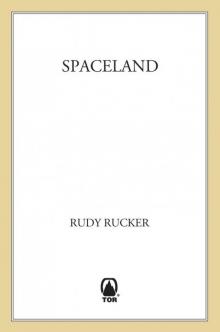 Spaceland
Spaceland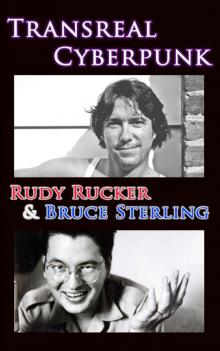 Transreal Cyberpunk
Transreal Cyberpunk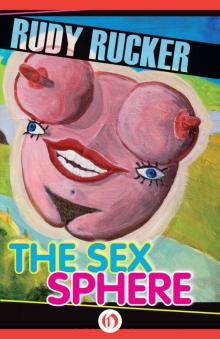 Sex Sphere
Sex Sphere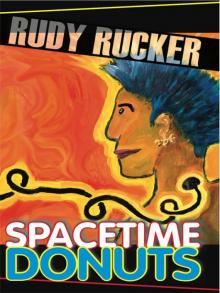 Spacetime Donuts
Spacetime Donuts Freeware
Freeware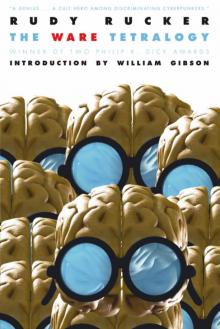 The Ware Tetralogy
The Ware Tetralogy Frek and the Elixir
Frek and the Elixir Junk DNA
Junk DNA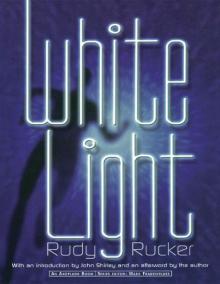 White Light (Axoplasm Books)
White Light (Axoplasm Books) Nested Scrolls
Nested Scrolls Inside Out
Inside Out Where the Lost Things Are
Where the Lost Things Are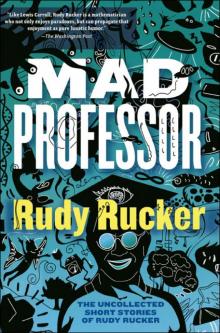 Mad Professor
Mad Professor As Above, So Below
As Above, So Below Realware
Realware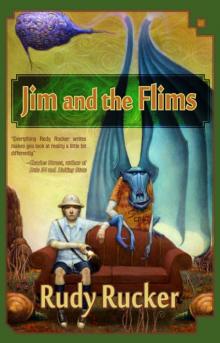 Jim and the Flims
Jim and the Flims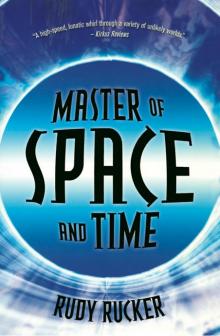 Master of Space and Time
Master of Space and Time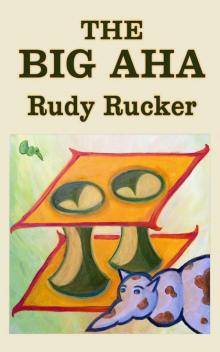 The Big Aha
The Big Aha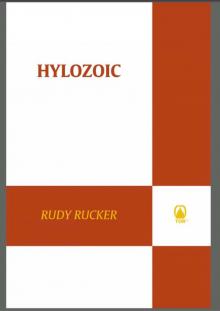 Hylozoic
Hylozoic